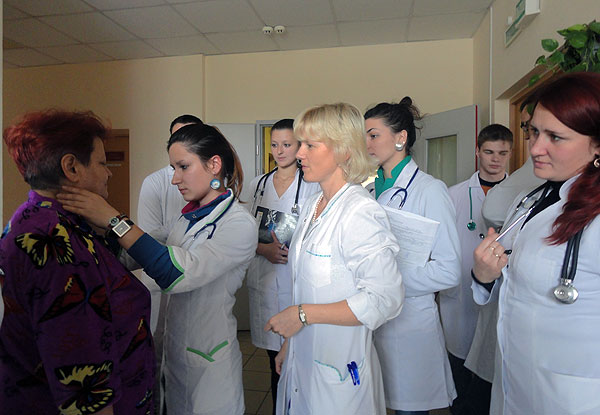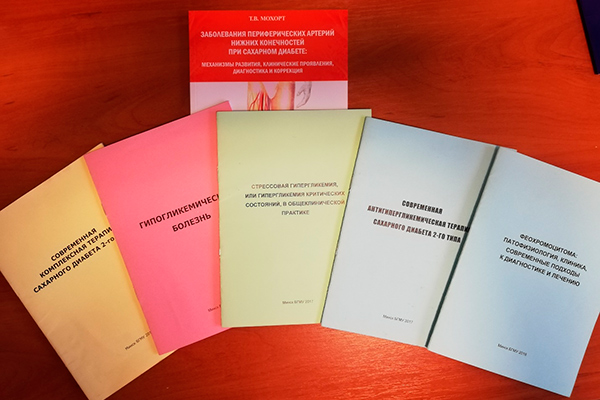The Department’s of Endocrinology educational process structuring is based on the general department сurriculum and personal сurriculums of the teaching staff. Curriculums are approved at the department meeting at the beginning of the academic year. To optimize the teaching of clinical endocrinology, which is largely an outpatient problem, the Department of Endocrinology has three clinical sites:
- 1st City Clinical Hospital (Minsk, Nezavisimosti Ave., 64)
- City Endocrinology Centre (Minsk, Kiseleva str., 7)
- Republican Center for Medical Rehabilitation and Balneotherapy (Minsk, Makaenka str., 17)
Documentation:
- curriculum and training programme
- workshops instructional guidelines
- workshops and lectures schedule
- students attendance and progress reports
The main aims and objectives of teaching Endocrinology to students are:
- development of medical skill set about endocrine system
- introduction of the possibilities of modern evidence-based medicine
- development of medical skill set about timely endocrine deseases diagnosis and treatment
- adoption of approaches of endocrine diseases prevention
Practical skills include the student's ability to:
- find out patients complaints, highlight the main syndromes and make a preliminary diagnosis based on the patient medical history and physical examination;
- develop a patient examination plan and formulate the diagnosis;
- prescribe appropriate treatment to the patient;
- develop specific measures for secondary and tertiary disease prevention and patient rehabilitation;
- interpret the results of hormone testing, glycemic profile and oral glucose tolerance test, general blood and urine tests, biochemical blood tests, coagulation test, thyroid biopsies results;
- interpret the results of ultrasonographic examination of the thyroid gland and neck organs, X-ray and MRI examinations of the pituitary gland, CT of adrenals and skeleton, thyroid and parathyroid scintigraphy scans;
- provide appropriate medical care in endocrine emergencies;
- make out medical records.

Training medical students at the Department of Endocrinology involves both classroom teaching and practical applications. Learning resources include educational and study guides, training manuals, textbook and other scientific papers written by the teaching staff. In the teaching and learning process electronic educational platform (e-learning BSMU) is used. It contains diverse instructional materials – text documents, videolectures, interactive presentations, tests and case studies. Multimedia technologies are widely used by the teaching staff of the department during the workshops, tutorials and lectures. All the learning resources are updated annually and are based on the latest international and belarusian guidelines, governing documents, research results and best clinical practice. The textbook «Clinical Endocrinology», co-authored by the members of faculty staff T.V. Mokhort, Z.V. Zabarovskaya, A.P. Shepelkevich, was published.

Required reading:
- T.V. Mokhort. Clinical Endocrinology: textbook / T.V. Mokhort, Z.V. Zabarovskaya, A.P. Shepelkevich. – Minsk, 2015. – 523 pp.
- T.V. Mokhort. Clinical Endocrinology: textbook / T.V. Mokhort, Z.V. Zabarovskaya, A.P. Shepelkevich. – Minsk, 2013. - 415 pp.
- Essential Endocrinology and Diabetes: Includes Free Desktop Edition / RichardI. G. Holt, Neil A. Hanley. 2012. 374 p.
Further reading:
- T.V. Mokhort. Diabetes treatment options: Instructional guideline/ Mokhort T.V., Minsk, 2016, 37 p.
- I.I. Dedov. Endocrinology. National guideline (2nd edition)/ Dedov I.I., Melnichenko A.G. – Publ.: GEOTAR-Media, 2016. 1112 p.
- E.G. Mokhort. Pheochromocytoma: pathophysiology, clinical perfomance, latest diagnostic and treatment approach: Instructional guideline/ Mokhort E.G., Shyshko E.I., Bylodid I.K.., Shepelkevich A.P., Mokhort T.V. - Minsk: BSMU, 2018. – 22 p.
- I.K. Bylodid. Stress or critical illness hyperglycemia in general practice: Instructional guidelines / Bylodid I.K., Mokhort T.V., Shyshko E.I., Mokhort E.G., Shepelkevich A.P. – Minsk : BSMU, 2017. – 16 p.
- T.V. Mokhort. Antihyperglycemic therapy of type 2 diabetes mellitus: Instructional guideline/ Mokhort T.V., Shyshko E.I., Mokhort E.G., Bylodid I.K.., Shepelkevich A.P. Minsk: BSMU, 2017. – 28 p.
- Williams Textbook of Endocrinology. Sh. Melmed, K.C. Polonsky, P. Reed Larsen et al. Elsevier; 13th edition, 2015, 1936 p.
- A.S. Ametov. Endocrinology: textbook for medical students/ Ametov A.S., Shustov S.B., Halimov Y.Sh.. – Publ.: GEOTAR-Media, 2016. 352 p.
- I.M. Hmara. Hypoglycemic disease (aetiology, clinical performance, diagnostic approach, treatment): Instructional guideline / Hmara I.M. et al. Minsk: BSMU, 2016. 28 p.
- I.M. Hmara. Diagnosis, clinical perfomance, treatment and monitoring of nodular goiter: Instructional guideline / Hmara I.M. et al. Minsk: BSMU, 2015. 28 p.
- A.P. Shepelkevich. Primary hyperparathyroidism: the latest diagnostic and treatment approaches: Instructional guideline/ Shepelkevich A.P. et al. Minsk: BSMU, 2015, 28 p.
- A.P. Shepelkevich. Subclinical and overt hypercorticism: Instructional guideline/ Shepelkevich A.P. et al. Minsk: BSMU, 2015, 28 p.
- T.V. Mokhort.Diabetic Emergencies: Instructional guideline/ Mokhort T.V. et al. Minsk: BSMU, 2011, 21 p.
- I.I. Dedov. Endocrinology: study guide for medical students / Dedov I.I., Melnichenko G.A., Fadeev V.V. Publ.: Medicina, 2007. 425p.
- T.V. Mokhort. Endocrine Emergencies: Instructional guideline/ Mokhort T.V. et al. Minsk: BSMU, 2020, 44 p.
- A.P. Shepelkevich. Menopause transition: Instructional guideline/ Shepelkevich A.P. et al. Minsk: BSMU, 2020, 24 p.
International Guidelines and Recommendations:
Recommendations by the World Health Organization (WHO), the International Diabetes Federation (IDF), the American Association of Clinical Endocrinologists (AACE), European Society of Endocrinology (ESE), European Association for the Study of Diabetes (EASD), the International Council for Control of Iodine Deficiency Disorders (ICCIDD) accepted in the countries of Europe, Asia and America.